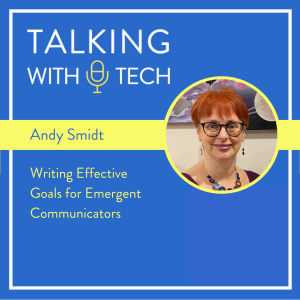
Wednesday Apr 27, 2022
Andy Smidt: Writing Effective Goals for Emergent Communicators
This week, we hear from Dr. Andy Smidt, a professor at the University of Sydney who teaches a number of courses related to communication and supporting people with severe intellectual disabilities. Andy shares about teaching pre-service professionals in unique ways, her “TEAM” taxonomy that can help write goals for emergent (presymbolic) communicators, and more!
Before the interview, Rachel and Chris talk about playing “The Mind”, a card game where you only use observation and nonverbal communication to sequence a set of cards together. They reflect on what they learned playing this game, including how essential nonverbal communication is to our everyday lives and how we can learn to observe very subtle signals. They also share about how we can observe nonverbal communication and then attach language to it in a therapeutic setting.
Key ideas this week:
🔑How do we support someone with severe intellectual disabilities who is presymbolic and may never become symbolic? We can presume their potential, but becoming a symbolic communicator may take a long time. How do we write goals to be worked on right now? Andy came up with the TEAM taxonomy for goal writing that is useful when working with pre-symbolic communicators:
- T = Train, e.g. train communication partners
- E = Expand, e.g. expanding what the AAC use already does. Expand the people they interact with, the activities they participate in, the situation in which the person uses potential communicative acts, expand the people who can interpret these communicative acts.
- A= Augment, e.g. add something new. Allow the person to make choices in their daily routine. Add in new object symbols, community request cards, etc.
- M= Move, e.g. for the person to move to become intentional or symbolic.
🔑In some cases, we need to regroup when we have hit a roadblock and look back at the TEAM framework. You might want to give it a few months and not add anything new - the AAC user may need a break to get comfortable with what they have already learned.
🔑Most clinicians feel they are doing family centered practice, but research indicates most families would say their therapy is not family centered. Family centered practice means going at the speed of the family, which may be slow if that is what they need.
Links from this Episode:
Full Text of Andy's article on the TEAM process
Visit talkingwithtech.org to access previous episodes, resources, and CEU credits that you can earn for listening to TWT episodes!
Help us develop new content and keep the podcast going strong! Support our podcast at patreon.com/talkingwithtech!
No comments yet. Be the first to say something!